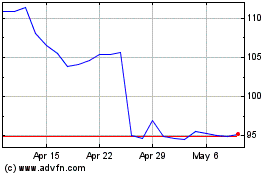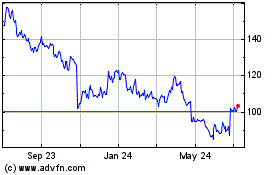By Paul Page
Sign up: With one click, get this newsletter delivered to your
inbox.
A new trade battleground is forming and it's in the laundry
room. Whirlpool Corp. is asking the U.S. International Trade
Commission to support tough new actions to stave off what the
washing machine maker says is unfair competition from South Korea.
Moves to back Whirlpool would push the increasingly aggressive U.S.
trade stance into new and strongly protectionist territory, the
WSJ's Andrew Tangel writes, by reviving a long-dormant measure that
requires only that a U.S. industry has suffered "serious injury"
from foreign competition. Whirlpool says it's getting dinged by
South Korea's Samsung Electronics Co. and LG Electronics Inc.,
which have made inroads in the U.S. in recent years with their
sleek appliance designs. Whirlpool has won some regulatory
skirmishes with the South Korean producers, but its push for
stronger actions are putting the manufacturer at the center of a
larger tug-of-war in Washington between free-trade skeptics and
those who argue the competition from abroad builds a market that's
more efficient and affordable for consumers.
While the appliance makers battle over potential tariffs, the
U.S. and South Korea are moving toward changing their trade
agreement. The countries' top trade officials agreed in a meeting
in Washington to amend the U.S.-Korea pact known as Korus, the
WSJ's William Mauldin and Kwanwoo Jun report, although there was no
suggestion of what parts of the deal they want to address. Business
groups that back the free trade agreement are likely to be
reassured by the relative calm of this week's meeting, which came
after sharp criticism of the deal a few weeks ago from President
Donald Trump. The Trump administration recently considered taking
steps to exit from the trade pact, but those deliberations
coincided with North Korean missile tests. And unlike the barbs
that have marked the talks around the North American Free Trade
Agreement, the countries in this case are aiming to change the deal
rather than start from scratch with a complete renegotiation.
Sears is barely hanging on in Canada, caught between lenders who
want to liquidate the retailer and managers who want to keep a
slimmed-down version of the business open. Sears Canada Inc.'s top
executive is making a last-ditch effort to patch together financing
to buy the business, the WSJ's Andrew Scurria and Jacquie McNish
report, while creditors want to sell off the assets and quickly get
what they can. They're rushing to get Sears' fate settled before
the Christmas selling season, when the inventory will lose its
value as the holidays near. The battle marks a grim finale for the
Canadian edition of the iconic retailer, and the latest result of
the dramatic change in the retail landscape triggered by online
sales. A decision on Sears Canada Executive Chairman Brandon
Stranzl's buyout bid could come this week. Among the pieces
potentially up for grabs: the company's S.L.H. Transport Inc.
logistics business.
ECONOMY & TRADE
The U.S. is becoming an export powerhouse in an unlikely
arena.U.S. crude oil exports surged to 1.984 million barrels a day
last week, the WSJ's Alison Sider reports, busting by nearly
500,000 barrels a day a record that had been set only the week
before. The crude export rate is approaching a level that is almost
as much as Kuwait sends abroad and the latest sign that the U.S. is
remaking the global oil distribution map as it resets its own
domestic energy production. The U.S. is still an oil importer. But
net imports of crude fell to a record low last week, and analysts
at Citigroup said almost all of the imported crude last week was
from Canada, writing that the data was "a harbinger of a more
sustainable trend to come." The U.S. is gaining sales because the
crude is cheaper than oil from other markets, and the revenue may
help draw investment for even more exporting capacity.
Apparently not satisfied with cornering the market in various
retail sectors Amazon.com Inc. is also looking to lock up the top
business talent. The Seattle-based retail giant is now the No. 1
recruiter at some of the top business schools in the country, the
WSJ's Kelsey Gee writes, and the biggest internship destination at
prestigious schools including the Massachusetts Institute of
Technology, Dartmouth College and the University of Chicago Booth
School of Business. Amazon's aggressive approach is drawing a big
following, upending campus recruiting and blocking other companies
that rely on B-school hires. It's a familiar pattern in other areas
such as logistics, where Amazon has scaled up quickly by luring
large numbers of executives that have helped build a sprawling
fulfillment network. At business schools, Amazon is outpacing
traditional big recruiters like Bain & Co. or McKinsey &
Co. -- consultants that typically hire hundreds of graduates a year
to help companies figure out how to respond to tough market
competition.
QUOTABLE
IN OTHER NEWS
European antitrust regulators ordered Luxembourg to recoup $294
million from Amazon in allegedly unpaid taxes. (WSJ)
Duke Realty Corp. is buying logistics properties from Bridge
Development Partners LLC as the company shifts its focus from
office buildings. (WSJ)
Private employers in the U.S. added a less-than-expected 135,000
jobs in September. (WSJ)
A measure of service-sector activity across the U.S. rose in
September to a 12-year high. (WSJ)
Retail sales declined across the euro area for the second
straight month in August. (WSJ)
Monsanto Co. says new strains of seeds helped swing the company
to a $20 million net profit in its latest quarter. (WSJ)
Foxconn Technology Group named the Mount Pleasant, Wis., as the
site of its new display screen factory. (Associated Press)
Vietnam is trying to help garment exporters cut labor and
logistics costs after seeing demand for products waver. (Sourcing
Journal)
South Dakota is petitioning the U.S. Supreme Court to reconsider
a 25-year-old ruling restricting states' ability to tax remote
retailers. (Bloomberg)
French supermarket chain Leclerc says Amazon has approached the
company about a potential logistics partnership. (Reuters)
Wal-Mart Stores Inc. is boosting its investment in a new
distribution center in Mexico's Yucatan region. (Yucatan Times)
Chicago is considering a plan setting health, fair labor and
environmental standards for city food purchases. (WTTW)
Google will work with Rolls-Royce Holdings PLC on technology for
autonomous ships. (Port Technology)
Global airfreight traffic rose 12.1% in August, far ahead of a
4.7% gain in capacity. (Air Cargo News)
Workers at Royal Mail voted to authorize a strike in a dispute
over pensions and pay. (BBC)
Deutsche Post is testing use of a small robot that would
accompany mail delivery workers. (Stat Trade Times)
Industrial supplier Carlisle Companies Inc. is buying Accella
Performance Materials for $670 million. (Industrial
Distribution)
San Diego will allow cultivation of marijuana so products don't
have to be trucked to the city. (Los Angeles Times)
A Georgia town is offering to create a city called Amazon to
attract the e-commerce company's second headquarters. (Atlanta
Journal-Constitution)
Missouri is funding a study on use of Hyperloop transport to
move across the state in 25 minutes. (New Atlas)
ABOUT US
Paul Page is deputy editor of WSJ Logistics Report. Follow him
at @PaulPage, and follow the entire WSJ Logistics Report team:
@brianjbaskin , @jensmithWSJ and @EEPhillips_WSJ. Follow the WSJ
Logistics Report on Twitter at @WSJLogistics.
Write to Paul Page at paul.page@wsj.com
(END) Dow Jones Newswires
October 05, 2017 06:42 ET (10:42 GMT)
Copyright (c) 2017 Dow Jones & Company, Inc.
Whirlpool (NYSE:WHR)
Historical Stock Chart
From Mar 2024 to Apr 2024

Whirlpool (NYSE:WHR)
Historical Stock Chart
From Apr 2023 to Apr 2024
